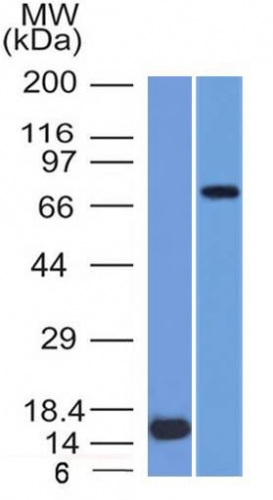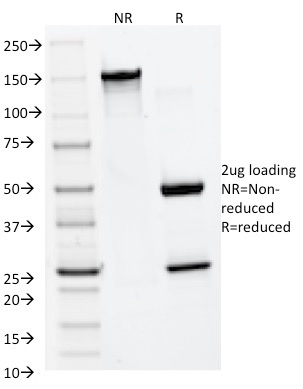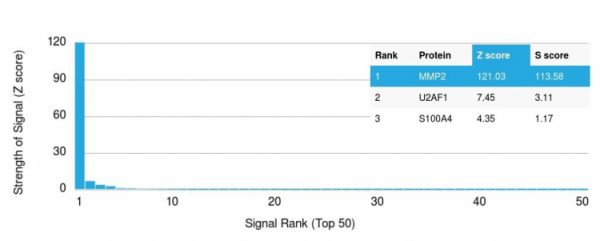Mouse Monoclonal Anti-MMP2 / Collagenase Type IV A (Tumor Metastasis Marker) [Clone MMP2/1501]
Cat# NB-36-00510-P1ABX
Size : 100ug
Brand : Neo Biotech
Free Shipping in the U.S. for orders over ." class="product type-product post-118144 status-publish first instock product_cat-monoclonals product_cat-mouse-monoclonals product_cat-primary-antibodies product_tag-huprot-validated-antibodies has-post-thumbnail taxable shipping-taxable purchasable product-type-variable">
MMP2 / Collagenase Type IV A (Tumor Metastasis Marker) Antibody [MMP2/1501]

Western Blot of (1) Recombinant MMP2 protein and (2) U87 cell lysate using MMP2 Monoclonal Antibody (MMP2/1501).

SDS-PAGE Analysis of Purified MMP2 Monoclonal Antibody (MMP2/1501). Confirmation of Integrity and Purity of Antibody.

Analysis of Protein Array containing more than 19,000 full-length human proteins using MMP2 Mouse Monoclonal Antibody (MMP2/1501) Z- and S- Score: The Z-score represents the strength of a signal that a monoclonal antibody (Monoclonal Antibody) (in combination with a fluorescently-tagged anti-IgG secondary antibody) produces when binding to a particular protein on the HuProtTM array. Z-scores are described in units of standard deviations (SD's) above the mean value of all signals generated on that array. If targets on HuProtTM are arranged in descending order of the Z-score, the S-score is the difference (also in units of SD's) between the Z-score. S-score therefore represents the relative target specificity of a Monoclonal Antibody to its intended target. A Monoclonal Antibody is considered to specific to its intended target, if the Monoclonal Antibody has an S-score of at least 2.5. For example, if a Monoclonal Antibody binds to protein X with a Z-score of 43 and to protein Y with a Z-score of 14, then the S-score for the binding of that Monoclonal Antibody to protein X is equal to 29.
Applications & Dilutions
Summary
It recognizes a protein of 72kDa, which is identified as MMP2. The matrix metalloproteinases (MMP) are a family of peptidase enzymes responsible for the degradation of extracellular matrix components, including collagen, gelatin, Fibronectin, Laminin and proteoglycan. Transcription of MMP genes is differentially activated by phorbol ester, lipopolysaccharide (LPS) or staphylococcal enterotoxin B (SEB). MMP catalysis requires both calcium and zinc. MMP-2 (also designated type IV collagenase) cleaves collagen types IV,V, VII and X and gelatin type I. Activation of MMP-2 secretion requires the Ras signaling pathway.
Product Properties & Targets
Functions
- Ubiquitinous metalloproteinase that is involved in diverse functions such as remodeling of the vasculature, angiogenesis, tissue repair, tumor invasion, inflammation, and atherosclerotic plaque rupture. As well as degrading extracellular matrix proteins, can also act on several nonmatrix proteins such as big endothelial 1 and beta-type CGRP promoting vasoconstriction. Also cleaves KISS at a Gly-
- -Leu bond. Appears to have a role in myocardial cell death pathways. Contributes to myocardial oxidative stress by regulating the activity of GSK3beta. Cleaves GSK3beta in vitro. Involved in the formation of the fibrovascular tissues in association with MMP14.
- PEX, the C-terminal non-catalytic fragment of MMP2, posseses anti-angiogenic and anti-tumor properties and inhibits cell migration and cell adhesion to FGF2 and vitronectin. Ligand for integrinv/beta3 on the surface of blood vessels.
- Mediates the proteolysis of CHUK/IKKA and initiates a primary innate immune response by inducing mitochondrial-nuclear stress signaling with activation of the pro-inflammatory NF-kappaB, NFAT and IRF transcriptional pathways.
Key References
- Huhtala, P., et al. 1990. Structure of the human type IV collagenase gene. J. Biol. Chem. 265: 11077-11082.
PubMed Links
- https://pubmed.ncbi.nlm.nih.gov/2162831/
- https://pubmed.ncbi.nlm.nih.gov/1851724/
- https://pubmed.ncbi.nlm.nih.gov/14702039/
- https://pubmed.ncbi.nlm.nih.gov/15616553/
- https://pubmed.ncbi.nlm.nih.gov/15489334/
- https://pubmed.ncbi.nlm.nih.gov/2158484/
- https://pubmed.ncbi.nlm.nih.gov/2834383/
- https://pubmed.ncbi.nlm.nih.gov/1480041/
- https://pubmed.ncbi.nlm.nih.gov/1655733/
- https://pubmed.ncbi.nlm.nih.gov/8646777/
- https://pubmed.ncbi.nlm.nih.gov/9119036/
- https://pubmed.ncbi.nlm.nih.gov/9476898/
- https://pubmed.ncbi.nlm.nih.gov/10559137/
- https://pubmed.ncbi.nlm.nih.gov/11029402/
- https://pubmed.ncbi.nlm.nih.gov/11751392/
- https://pubmed.ncbi.nlm.nih.gov/11179305/
- https://pubmed.ncbi.nlm.nih.gov/11710594/
- https://pubmed.ncbi.nlm.nih.gov/12714657/
- https://pubmed.ncbi.nlm.nih.gov/12879005/
- https://pubmed.ncbi.nlm.nih.gov/14766804/
- https://pubmed.ncbi.nlm.nih.gov/17435175/
- https://pubmed.ncbi.nlm.nih.gov/19493954/
- https://pubmed.ncbi.nlm.nih.gov/18971601/
- https://pubmed.ncbi.nlm.nih.gov/22905912/
- https://pubmed.ncbi.nlm.nih.gov/22509276/
- https://pubmed.ncbi.nlm.nih.gov/7583664/
- https://pubmed.ncbi.nlm.nih.gov/8549817/
- https://pubmed.ncbi.nlm.nih.gov/10356396/
- https://pubmed.ncbi.nlm.nih.gov/10545322/
- https://pubmed.ncbi.nlm.nih.gov/11320090/
- https://pubmed.ncbi.nlm.nih.gov/12147339/
- https://pubmed.ncbi.nlm.nih.gov/11928808/
- https://pubmed.ncbi.nlm.nih.gov/12032297/
- https://pubmed.ncbi.nlm.nih.gov/21813640/
- https://pubmed.ncbi.nlm.nih.gov/11431697/
- https://pubmed.ncbi.nlm.nih.gov/15691365/
- https://pubmed.ncbi.nlm.nih.gov/16542393/
- https://pubmed.ncbi.nlm.nih.gov/16959974/



There are no reviews yet.